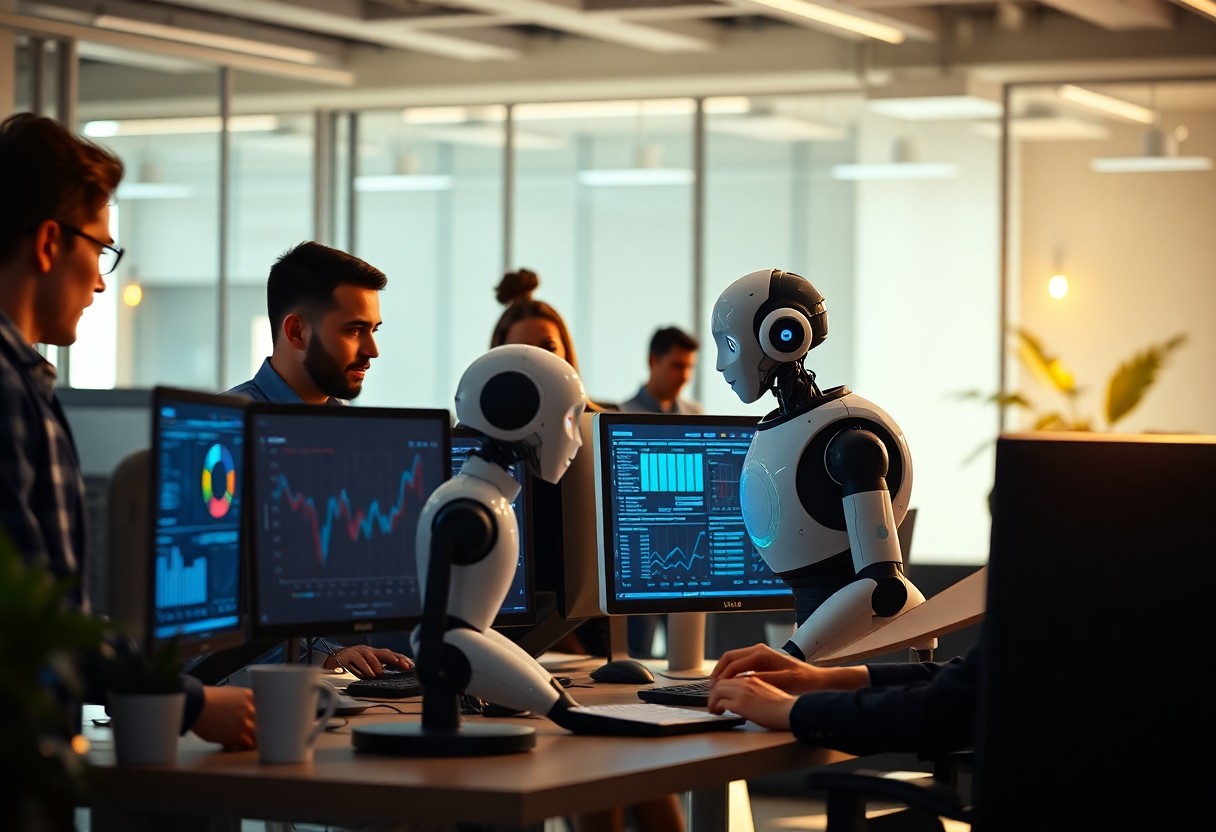Artificial intelligence is fundamentally transforming the modern workplace, enhancing productivity and redefining how we work. This isn’t just a trend—it’s a revolutionary shift that demands understanding and adaptation to remain competitive in an increasingly automated world.

The AI Revolution: Transforming Workplace Dynamics
AI integration represents a transformative force reshaping workplace dynamics. Data-driven strategies are replacing intuition-based decisions, fostering agility in responding to market changes. As intelligent tools become embedded in daily operations, workplaces evolve into collaborative ecosystems focused on efficiency, innovation, and continuous learning. Automation is streamlining repetitive tasks, allowing professionals to focus on higher-value responsibilities. Research indicates that by 2030, up to 30% of jobs will be significantly transformed by automation, necessitating workforce adaptation and skill development. The relationship between humans and machines is evolving from simple tool usage to active partnership. AI systems analyze vast datasets, providing insights that enable rapid, informed decision-making. Successful organizations leverage this collaboration to enhance creativity and innovation. In healthcare, for example, AI assists professionals in diagnostics, dramatically improving patient outcomes through data-driven insights. Rather than replacing human workers, AI augments capabilities, allowing focus on complex problem-solving and emotional intelligence—areas where technology falls short.
Harnessing Data: Decision-Making in the Age of AI
AI transforms raw information into actionable insights, giving organizations strategic advantages. Advanced algorithms analyze historical patterns and identify trends, improving both accuracy and speed of decision-making processes. Predictive analytics enables forecasting future performance based on existing data trends. Machine learning models inform resource allocation, risk management, and sales strategies, ensuring teams focus on high-impact initiatives. This proactive approach enhances operational efficiency and improves outcomes across organizations. Real-time data insights provide immediate responsiveness to changing circumstances. Companies using AI-driven dashboards can track sales trends as they happen, enabling instant adjustments to marketing campaigns or inventory management. Studies show 80% of businesses leveraging real-time analytics report improved decision-making and strategic foresight. This dynamic capability ensures organizations aren’t just reacting to data post-event but actively shaping strategy as events unfold, driving continuous improvement and greater market agility.
Enhancing Employee Productivity with Intelligent Tools
AI-powered applications automate repetitive activities, allowing teams to focus on strategic initiatives. Robotic Process Automation (RPA) handles data entry, schedule management, and invoice processing automatically, accelerating task completion while minimizing errors. This shift not only speeds up vital tasks but also reduces human error, enabling teams to redirect energy toward more valuable projects. Personalized learning and development programs leverage AI to create customized educational experiences. By analyzing individual performance data, intelligent tools suggest specific courses and resources based on strengths and weaknesses, fostering continuous improvement culture. This targeted approach increases engagement, retention, and skill acquisition, directly impacting team performance and innovation. AI-driven learning platforms show higher completion rates and improved skill development, with organizations able to continually refine programs to align with evolving business needs and employee aspirations.
Ethical Considerations in AI Adoption
AI adoption requires careful navigation of ethical considerations, including algorithmic bias, workforce displacement, and accountability for AI-driven decisions. Balancing technological advancement with ethical responsibility ensures compliance while fostering trust among employees and customers. Organizations must create environments where automation complements rather than replaces human efforts. Involving workforce in transitions and emphasizing upskilling empowers employees to leverage AI technologies effectively, ensuring their roles remain valuable. Data security becomes paramount as AI solutions integrate into daily operations. Organizations must prioritize protection of personal data as AI usage increases, making robust security protocols crucial. Implementing encryption methods, access controls, and regular audits prevents unauthorized access and identifies vulnerabilities. Establishing clear data governance frameworks ensures accountability and transparency while building stakeholder trust. Focus on transparency regarding data usage and compliance with regulations like GDPR builds assurance within organizations, cultivating trust that enhances reputation and operational integrity.
Future-Proofing Careers in an AI-Driven Landscape
Anticipating AI’s impact on employment is vital for career relevance. As automation reshapes industries, emphasizing adaptability, in-demand skills, and continuous learning becomes essential for thriving in dynamic job markets. Skills that complement AI capabilities—critical thinking, emotional intelligence, creativity, and complex problem-solving—set professionals apart. These human-centric abilities are difficult for machines to replicate, enhancing value to employers and fostering collaboration with advanced technologies rather than competing against them. Lifelong learning and adaptability are crucial for staying competitive. Engaging in online courses, training programs, and professional networks allows professionals to embrace new technologies and methodologies. Platforms like Coursera and Udacity offer courses in AI, data analysis, and emerging fields, while networking events and workshops provide opportunities to learn from industry leaders. Regularly updating skillsets ensures professionals remain relevant and resilient against rapid technological change, enabling them to pivot as job landscapes shift.
Conclusion
The integration of AI in the workplace represents both opportunity and challenge. Organizations that successfully harness human-machine collaboration see enhanced creativity, improved decision-making, and increased operational efficiency. The key lies not in fearing replacement but in embracing augmentation—using AI to amplify human capabilities and focus on uniquely human contributions. As we navigate this transformation, the most successful professionals and organizations will be those that view AI as a powerful ally rather than a threat. By developing complementary skills, maintaining ethical standards, and committing to continuous learning, we can shape a future where intelligent tools enhance human potential rather than diminish it. The AI revolution is here, and those who adapt thoughtfully will find themselves at the forefront of unprecedented opportunities for growth, innovation, and meaningful work.
